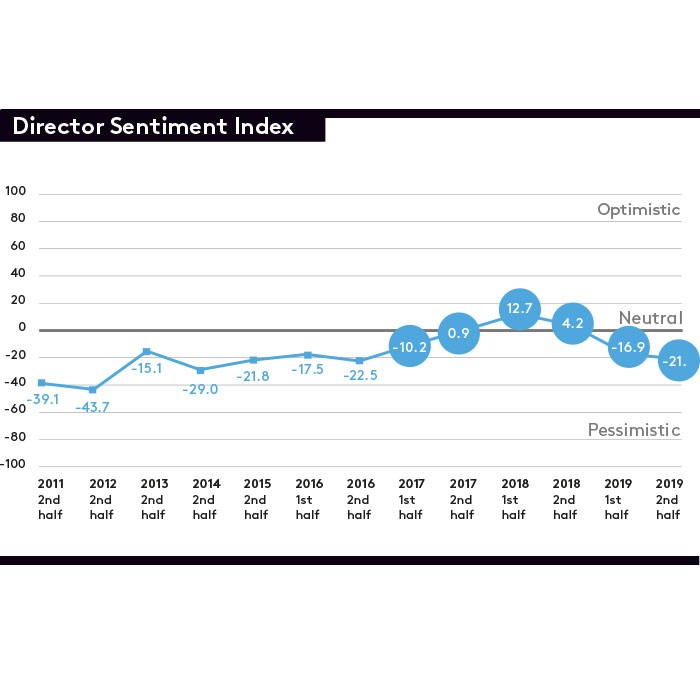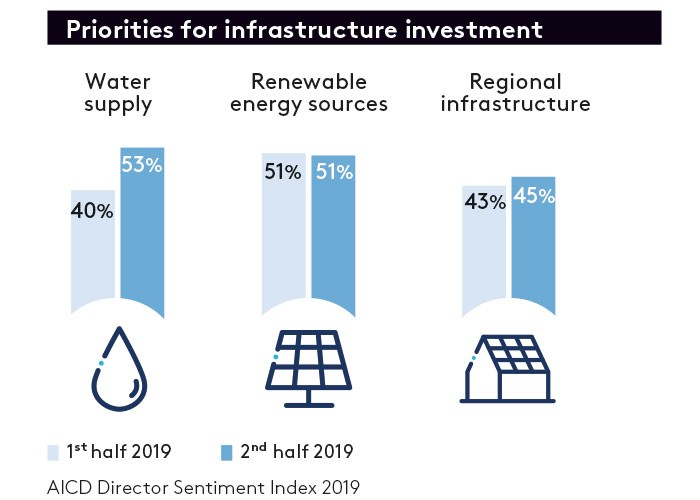Results from our bi annual Director Sentiment Index show directors want action on climate change, renewable energy and infrastructure.
The AICD Director Sentiment Index shows increased pessimism about the economic outlook with sentiment about the health of Australian, Asian, European and US economies at its lowest point in three years. However, the latest index, based on polling of AICD members in September, shows directors’ views on future business growth remain positive, with 43 per cent of those surveyed expecting their business to grow to June 2020.
One third say they expect staffing/labour demand and investment levels to increase in 2020 with the majority (47 per cent and 44 per cent respectively) expecting these to remain stable. On the wage front, 39 per cent of directors say they expect wages to increase a little; 55 per cent expect them to remain stable. The profit outlook is also holding up, with 36 per cent of directors expecting an increase in profits for the second half of this financial year and 31 per cent expecting an increase in profits compared to the budget forecast for January–June 2020.
Expectations about credit availability for acquisitions easing also improved. Nearly two thirds (64 per cent) of directors say an improved economic outlook would encourage their business to increase its level of investment/capital expenditure during the next year — followed by Australian economic policy certainty and enhanced focus on long-term returns.
What’s keeping directors awake?
While global economic uncertainty and low productivity are viewed as the main business challenges, sustainability and long-term growth prospects are what directors say keeps them awake at night. Global economic conditions, legal and regulatory compliance, cybercrime and structural change/changing business models are mentioned as concerns by at least one in five directors.

When it comes to short- and long-term government policy priorities, energy policy, climate change and infrastructure are the top three issues directors want action on. Water supply was nominated as the top priority for infrastructure investment, and 17 per cent of directors say drought is the top economic challenge. The percentage of directors who believe infrastructure spending is too low has increased from 65 per cent to 74 per cent.
Red tape
When it comes to governance issues, directors are more concerned about current governance regulations compared to the first half of 2019, with 43 per cent saying they are “somewhat onerous”, 38 per cent “about right” and 12 per cent “far too onerous” — up from nine per cent.
D&O Insurance has become more of an issue, with 28 per cent of directors saying insurance is readily available for their boards and 38 per cent saying it is slightly difficult to obtain.
Forty-two per cent of directors expect the level of “red tape” to increase in the next 12 months and 77 per cent identify corporate reporting requirements as the aspect of their business most affected by red tape — followed by workplace health and safety, and preparing/paying taxes.

Why so risk averse?
Seventy per cent of directors say there is a risk-averse decision-making culture on Australian boards, saying this is driven by an excessive focus on compliance over performance, followed by pressure from shareholders for short-term returns, and lack of genuine diversity in the boardroom. However, 89 per cent of directors say their board is trying to effect cultural change in their organisation, 58 per cent say their business is actively seeking to improve gender diversity, and 40 per cent are actively trying to increase ethnic diversity.
Latest news
Already a member?
Login to view this content

